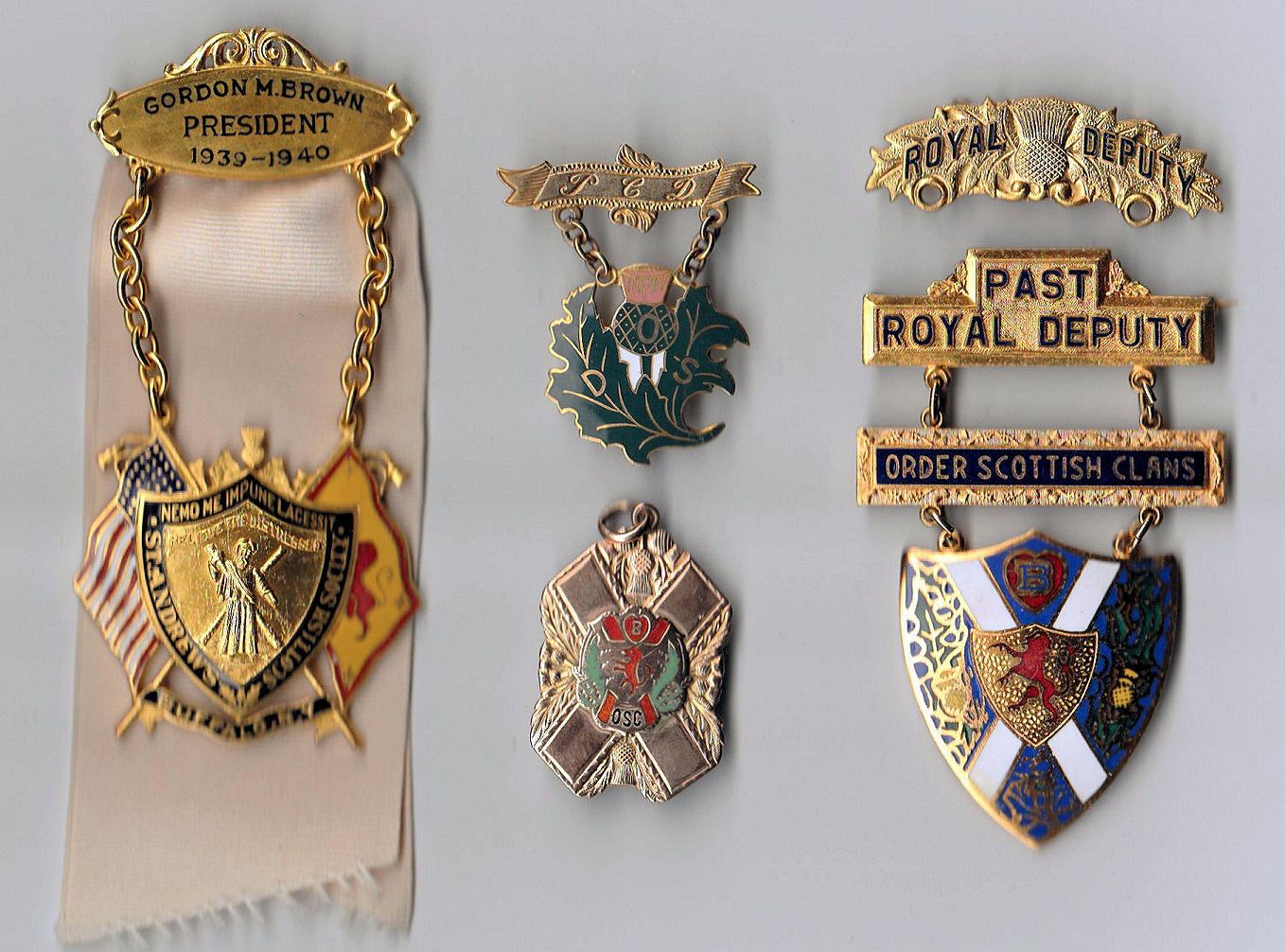Scottish American Clans

Bagpipes, Tartan & Insurance:
Scottish-American Fraternalism
in the 19th Century
By
Todd
Wilkinson
PM, Solomon Lodge No. 271, AF &
AM, Springfield MO
Member, Webster Lodge No. 98,
Marshfield MO
During the 19th
century, many American males were members of a myriad of fraternal
organizations – the Masons, Odd Fellows, Knights of Pythias, the Grand Army of
the Republic, etc. Besides the social camaraderie and entertainment that
these organizations provided, many joined for mutual-aid benefits, such as
insurance, old-age homes, etc, and in the case of immigrant organizations, to
maintain a social and cultural link to the “auld country”. While many St.
Andrews and Caledonian Societies still exist in the United States today,
during the fraternal “craze” of the late 19th century, several
organizations with a Scottish “theme” were organized in the United States and
Canada.
The
Benevolent Order of Scottish Clans
A lesser known fraternal
organization, the Benevolent Order of Scottish Clans, or BOSC, was founded in
St. Louis, Missouri, On St. Andrew’s Day, 1878 (although some sources give a
later date of 1882) by James McCash and a number of fellow freemasons.
Besides being a social order
for Scots and Scottish-Americans, the Order also was a mutual aid society that
provided insurance to its members, since many businesses did not provide it
for their employees. Mutual-aid societies also provided relief for the widow
and orphan, tended the sick and buried the dead.
The ritual of the BOSC was
based on the story of the Battle of Largs in 1263, and the Battle of
Bannockburn in 1314. The emblem of the BOSC was the Scottish thistle, and the
motto, Nemo Me Impune Lacessit.
In addition, the BOSC served
a similar purpose to the Caledonian and St. Andrew’s Society – preserving
Scottish heritage and customs in the New World, as well as providing social
events for members. Clan Stewart No. 50 in Duluth, Minnesota, for example,
would hold an annual summer picnic at Fond du Lac, Wisconsin. Members were
ferried to the site of the Picnic on the banks of Lake Superior for a
day-along celebration of all things Scottish, including dancing, piping and
Highland games.
Wayne Rethford and June
Skinner Sawyers, in their book The Scots of Chicago: Quiet Immigrants and
Their New Society, tell of “Scotland Day”, which was held in Chicago on
September 30, 1933. The BOSC took a leading role in this celebration, which
consisted of performances by local pipe bands, and the Essex Scottish Regiment
Pipes & Drums from Canada, as well as Highland dancing, readings and speeches
by local Scottish-American dignitaries.
Each lodge took the name of a
Scottish clan; in the “Grand Clan of Missouri”, there was Clan Campbell No. 1,
Clan Douglas No. 3, Clan MacDonald No. 6, etc. The National organization was
referred to as the “Royal Clan”, which met in convention every two years. At
one time, the national headquarters were in Boston, Massachusetts. In 1971,
the BOSC merged with the International Order of Foresters.
Daughters of Scotia
There was also a ladies
auxiliary of the BOSC, the Daughters of Scotia, which was organized in 1895,
in New Haven, Connecticut. Originally a number of male members of the Order of
Scottish Clans were dual members of the DOS until the organization was up and
running.
Like the BOSC, the Daughters
also placed a strong emphasis on Scottish culture, history and traditions.
Only wives, daughters, mothers, sisters and widows of BOSC members could join.
The DOS is organized similar to the BOSC, for obvious reasons.
The Daughters still exist
today, and maintain a web site at:
http://www.daughtersofscotia.org/.
The
Sons of Scotland
In Canada, a similar order
and mutual aid society, the Sons of Scotland, was founded in 1876 and is very
active across the country. The first camp, Robert Burns No. 1, was organized
in Toronto, on June 27 of that year. By 1892, over 70 camps had been formed,
with a membership of some 6,000 individuals. Besides insurance, the “camp
doctor” provided free medical care (save surgeries and childbirth) to all
members.
Sons of Scotland “camps” are
located from Vancouver to Montreal, and organize Burns and St. Andrew’s
Suppers, ceilidhs, picnics, etc. The order also has a pipe band, The Sons of
Scotland Pipes & Drums, which is reportedly Canada’s oldest civilian pipe
band, organized in 1896.
Simon Fraser University
maintains archives of the records of the Sons of Scotland from 1895-1998.
While the Benevolent Order of
Scottish Clans is no longer around today, traces of its heyday can still be
seen, mostly in its surviving auxiliary, the Daughters of Scotland, and in the
occasional grave marker in a cemetery or a membership medal in an antique
store. Yet it can also be argued that the legacy of the BOSC is the numerous
Scottish clan societies that dot the United States & Canada and continue the
work of promoting Scottish heritage & culture at Highland Games and other
Scottish events.
Works Cited
Books:
Hewitson, Jim. Tam Blake &
Co.: The Story of Scots in America. Edinburgh: Canongate Press, 1993.
Rethford, Wayne and June
Skinner Sawyers. The Scots of Chicago: Quiet Immigrants and Their New
Society. Dubuque, Iowa: Kendall/Hunt Publishing Co., 1997.
Schmidt, Alvin J.
Fraternal Organizations. Westport, Connecticut: Greenwood Press, 1980.
Szasz, Ferenc Morton.
Scots in the North American West 1790-1971. Norman: University of Oklahoma
Press, 2000.
Web
sites:
Daughters of Scotia:
http://www.daughtersofscotia.org/
Simon Fraser University
Archives:
http://www.sfu.ca/archives/F-192/F-192.html
St. Louis Public Library:
http://www.slpl.lib.mo.us/libsrc/frat2.htm#O
Sons of Scotland:
http://www.sonsofscotland.com/index.html
Sons of Scotland Pipes &
Drums:
http://www.sospb.com/index.html
http://www.rootsweb.com/~srgp/flaghold/flag082.htm
Be sure to visit the
Scottish Tartans Museum in
Franklin, North Carolina
http://www.scottishtartans.org/BOSC.htm

